2012新版初一下Module4 Unit3 Language in use
文档属性
| 名称 | 2012新版初一下Module4 Unit3 Language in use | 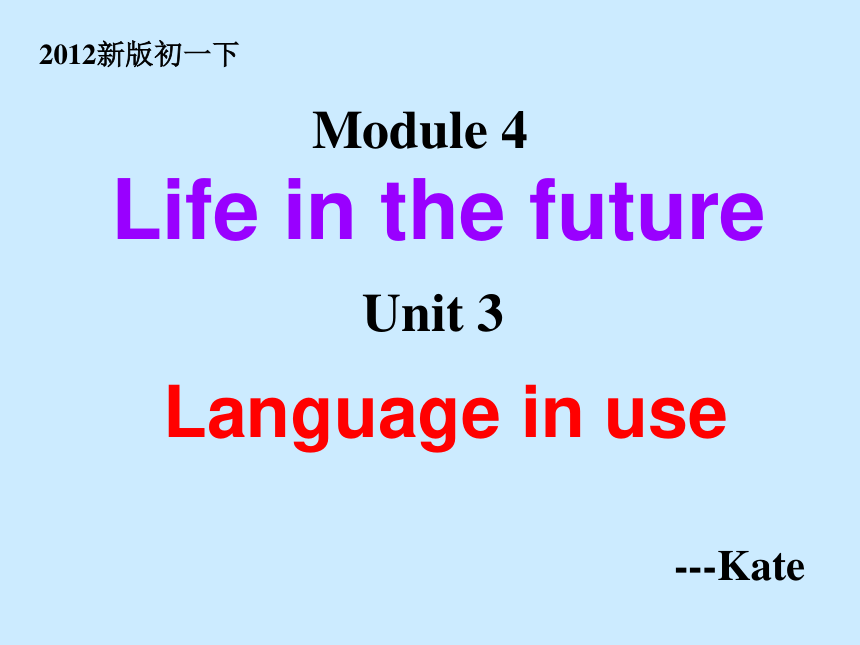 | |
| 格式 | zip | ||
| 文件大小 | 158.0KB | ||
| 资源类型 | 教案 | ||
| 版本资源 | 外研版 | ||
| 科目 | 英语 | ||
| 更新时间 | 2013-03-09 20:24:04 | ||
图片预览

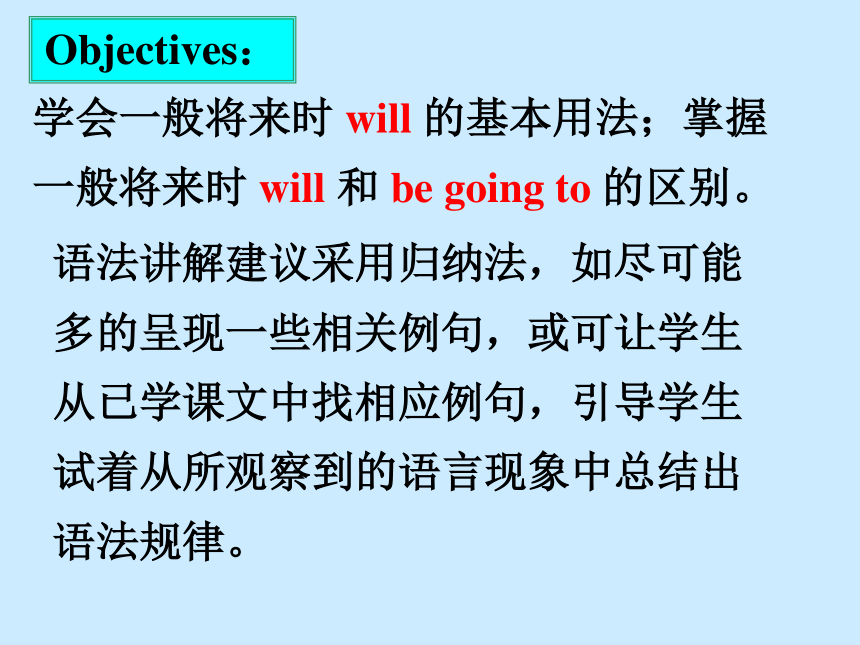
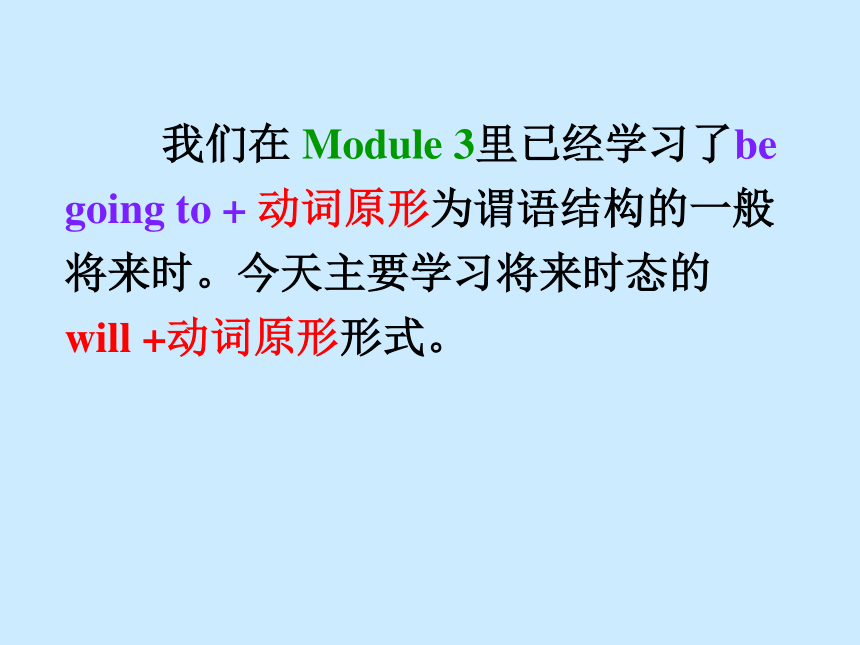
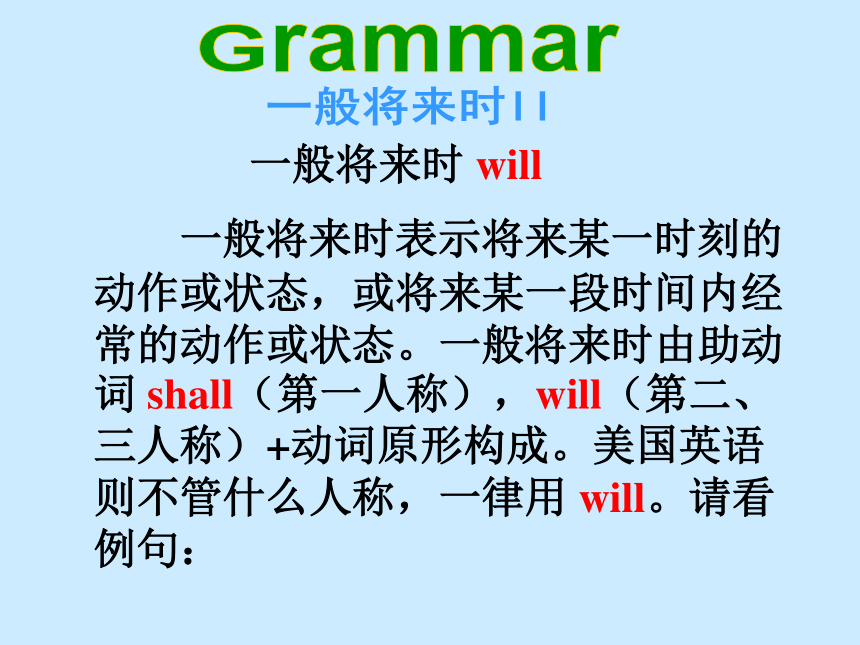
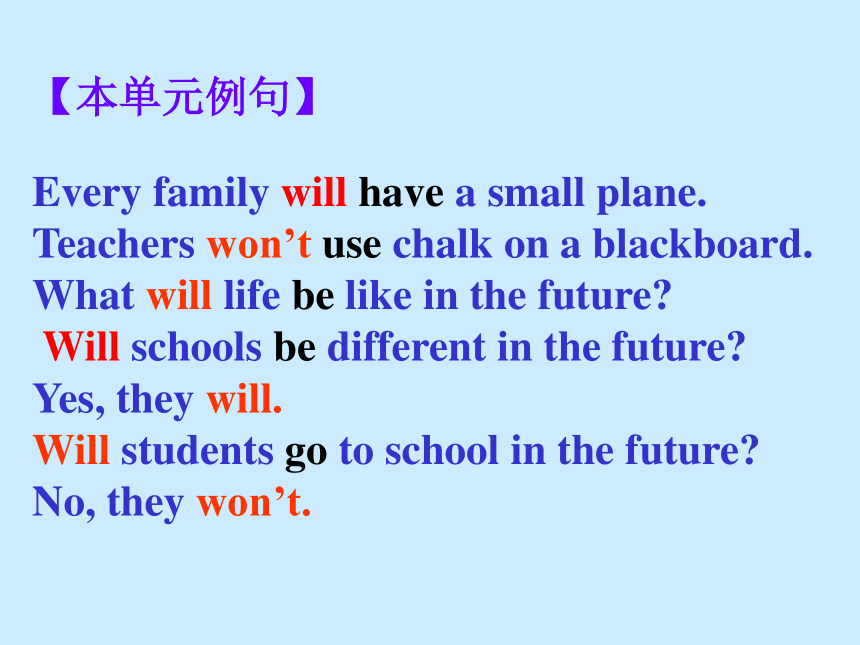

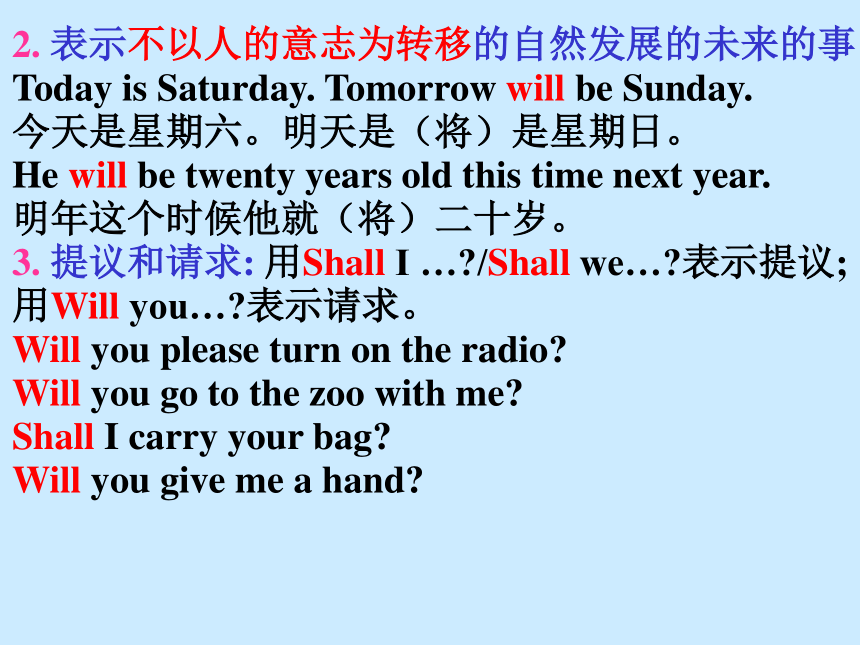



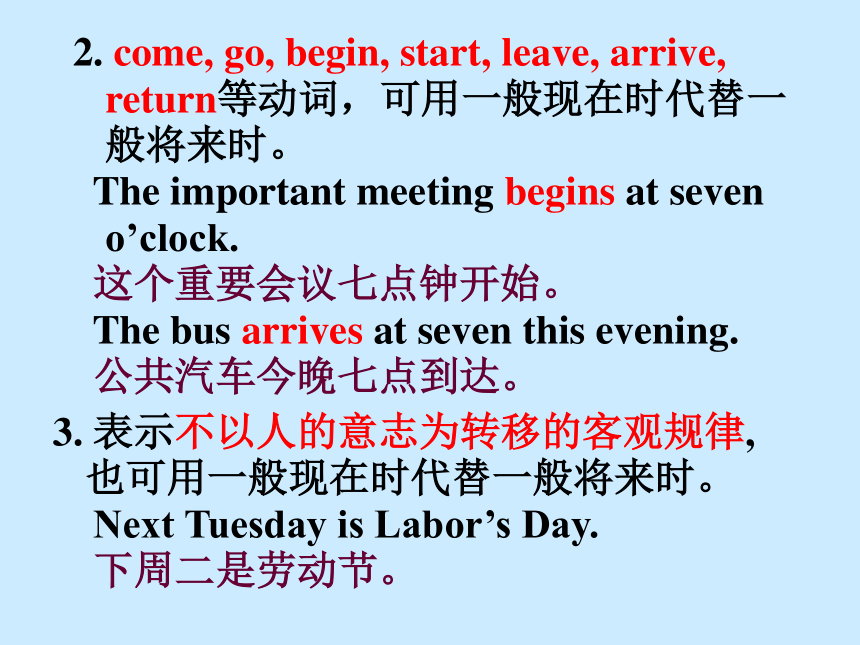
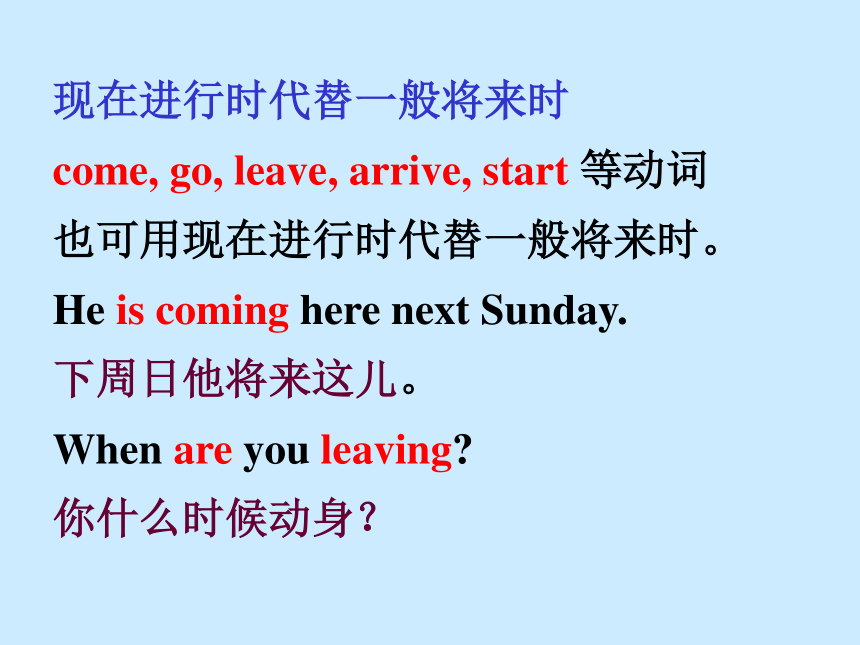
文档简介
课件38张PPT。Module 4Life in the futureUnit 3Language in use2012新版初一下---Kate Objectives:学会一般将来时 will 的基本用法;掌握
一般将来时 will 和 be going to 的区别。语法讲解建议采用归纳法,如尽可能多的呈现一些相关例句,或可让学生从已学课文中找相应例句,引导学生试着从所观察到的语言现象中总结出语法规律。 我们在 Module 3里已经学习了be going to + 动词原形为谓语结构的一般将来时。今天主要学习将来时态的 will +动词原形形式。Grammar一般将来时II一般将来时 will 一般将来时表示将来某一时刻的动作或状态,或将来某一段时间内经常的动作或状态。一般将来时由助动词 shall(第一人称),will(第二、三人称)+动词原形构成。美国英语则不管什么人称,一律用 will。请看例句: 【本单元例句】Every family will have a small plane.
Teachers won’t use chalk on a blackboard.
What will life be like in the future?
Will schools be different in the future?
Yes, they will.
Will students go to school in the future?
No, they won’t.一般将来时 will 的用法 will主要用在以下几个方面: 1.决定: 谈及正在作出的一项决定时, 常用I’ll=I will, 不能用be going to, 因为它表示事先就已经作出的决定。
They will go to visit the factory tomorrow. I’ll come with Wang Bing, Liu Tao and Yang Ling. —The phone’s ringing.??? —I’ll answer it.?? ? —Come to a party.? —OK. I’ll bring my
friend. 2. 表示不以人的意志为转移的自然发展的未来的事。 Today is Saturday.?Tomorrow will be Sunday. 今天是星期六。明天是(将)是星期日。 He will be twenty years old this time next year. 明年这个时候他就(将)二十岁。
3. 提议和请求: 用Shall I …?/Shall we…?表示提议; 用Will you…?表示请求。
Will you please turn on the radio????
Will you go to the zoo with me??????
Shall I carry your bag???
Will you give me a hand?be going to 与 will 的区别be going to 与 will 两者都可表示将要发生的事、将要去做某事, 但它们有如下几点区别: be going to 表示近期、眼下就要发生的事情,
will 表示的将来时间则较远一些。
He is going to write a letter tonight.
He will write a book one day.
2. be going to 表示根据主观判断将来肯定发生的事情, will表示客观上将来势必发生的事情。
He is outstanding. He is going to succeed.
He will be twenty years old. 这里的will是助动词,本身无意义,只
起语法作用。3. be going to 含有“计划, 准备”的意思,
而 will 则没有这个意思,如:
She is going to lend us her books.
He will be here in half an hour.
4. 在有条件从句的主句中, 一般不用 be
going to, 而多用will/shall进行预测。
(即如果一事发生,另一事也就发生)
If the telephone rings, I will answer it. 一般现在时代替一般将来时
1. hope, wish, want 等表“想要,希望”
的词汇无一般将来时,应用一般现
在时代替一般将来时。
I hope to see you again.
我希望再次见到你。
I want to get your help.
我想得到你的帮助。 2. come, go, begin, start, leave, arrive, return等动词,可用一般现在时代替一般将来时。
The important meeting begins at seven o’clock.
这个重要会议七点钟开始。
The bus arrives at seven this evening.
公共汽车今晚七点到达。3. 表示不以人的意志为转移的客观规律, 也可用一般现在时代替一般将来时。
Next Tuesday is Labor’s Day.
下周二是劳动节。 现在进行时代替一般将来时
come, go, leave, arrive, start 等动词
也可用现在进行时代替一般将来时。
He is coming here next Sunday.
下周日他将来这儿。
When are you leaving?
你什么时候动身? 否定句will一般将来时的否定句结构是: 在 will 后面加not即可。They won’t send their homework to the teacher by email.
There won’t be a computer on every desk in the future.
Students won’t talk to their teacher on their computers.They won’t read books.
They won’t use books.
The teachers won’t write on a blackboard with chalk.一般疑问句一般疑问句的结构是: will提到句首, some改为any, and改为or, 第一二人称互换。Will you/he/she/they…?Students will go to school in the future. (变为一般疑问句)Will students go to school in the future?I will buy some bread this afternoon.
(变为一般疑问句)Will you buy any bread this afternoon?特殊疑问句: 特殊疑问词+will+主语+动词原形+他?What/Where/When/Who…I will come to see you the day after tomorrow.
(对划线部分提问)What will you do the day after tomorrow?We will work in this factory every year.
(对划线部分提问)Where will you work every year?The students will come and work in the lab once a week. (对划线部分提问)Who will come and work in the lab once a week?根据要求改写下面的句子。1. They will use the Internet. 否定句:
一般疑问句:
肯定回答:
否定回答:They won’t use the Internet.Will they use the Internet?Yes, they will.No, they won’t.2. They will send their homework to the
teacher by email.否定句:
一般问句:
肯定回答:
否定回答:They won’t send their homework to the teacher by email.Will they send their homework
to the teacher by email?Yes, they will.No, they won’t.Complete questions about the future.1 _______________ (use) pens and papers?______________ (go) to school in the future?Will students useWill students go2 __________________(read) books?
3 _________________ (travel) by small
planes?
4 ________________ (send) emails to
teachers?Will students readWill students sendWill students travel2 Work in pairs. Ask and answer
the questions in Activity 1.---Will students go to school in the future?
--- Yes, they will./ No, they won’t.
They’ll study at home.1 Will students use pens and papers?
No, they won’t.
They’ll use the computers.2 Will students read books?
Yes, they will.3 Will students travel by small planes?
Yes, they will.
4 Will students send emails to teachers?
Yes, they will.DialogueA: Will students use _____________ in the
future?
B: No, they won’t. They’ll use __________.pens and paper computers结对完成对话。DialogueA: Will students __________ in the
future?
B: No, they won’t. They’ll ___________. go to school stay at homeDialogueA: Will teachers _____________________
with chalk?
B: No, they won’t. They’ll __________
to students. write on the blackboard send emailsPut the words in brackets in the correct places in the sentences. They’ll have a lot of time! (free)
1 People won’t any jobs. (difficult)
2 Robots will do work on farms. (heavy)
They’ll have a lot of free time!Robots will do heavy work on farmsPeople won’t any difficult jobs.3 People will have holidays. (long)
4 There will be rain this evening. (light) People will have long holidays.There will be light rain this evening.5 We’ll speak English. (good)
6 Every family will have a plane. (small)We’ll speak good English.Every family will have a small plane. Put the words and expressions from the box into the correct columns. email heavy rain
heavy work hot summer interesting job Internet
small plane traffic jam warm winter wind Heavy rain hot summer
wind warm winteremail Internetheavy work
interesting jobsmall plane traffic jamAround the world Robots in JapanJapan has many robots now and you can see lots of them in the country. You can find worker robots, robots that clean your home, and even robots you can play with.Schools Homes Travel Weather5 Think about life in the future.
Write down your ideas.Our dream schoolOur dream school will be modern and beautiful. The classroom will be/have…
The lessons will/won’t be…
The playground will/won’t be…A: What will school be like in the future?
B: The teacher won’t write on a blackboard…
C: How will our homes change?
D: There will be more machines…Work in groups of four. Talk about
your ideas. Decide on five good ideas.A: Will we find new ways travel?
B: Yes, we will. We’ll…
C: Will the weather change?
D: Yes, it will. It will be… 1. — Who are you talking _______?
— Lucy.
— What are you talking ____?
— Nothing important.
A. to ; to B. with ; about
C. with; to D. about; toQUIZ I. 选择填空。2. He usually goes to school____ bike not
___ a bus.
A. by ; by B. by; on
C. on; on D. on; by
3. The panda ____ a baby in a few weeks.
A. will have B. has had
C. had D. is going to be4. — What will the future ______?
— Who knows.
A. be like B. be C. like D. likes as
5. — People will live on the moon in the future.
— __________.
A. I think B. No, they will
C. I hope so D. Yes, they won’t 6. I have a lot of things _____ this weekend.
A. to B. will do
C. to do D. are going to
7. “What can you see in the box?” “_______.”
A. Everyone B. Everything
C. No one D. Nothing People in the north often go skating in winter.
(next winter)
?
2. There are two cinemas in that town. (next year)
?
3. He comes back late. (in two days)
?
4. She is a conductor of a train. (soon)
?
5. Li Ming is ten years old. (next year)II. 句型转换。He will come back late in two days.People in the north will go skating next winter.She will be a conductor of a train soon.There will be two cinemas in that town next year.Li Ming will be ten years old next year. There is no life on Mars.
2. Can you give me a piece of chalk?
3. There is no one in the classroom.
No one likes doing sports.?
5. Walking and swimming are good exercises.没有人喜欢做运动。教室里没有人。火星上没有生命。你能给我一支粉笔吗?散步和游泳都是很好的运动。III. 英译汉。1. To preview the Module 5-unit 1
2. To practise the vocabularyPreviewHomeworkReview the future simple “will” in this module.
一般将来时 will 和 be going to 的区别。语法讲解建议采用归纳法,如尽可能多的呈现一些相关例句,或可让学生从已学课文中找相应例句,引导学生试着从所观察到的语言现象中总结出语法规律。 我们在 Module 3里已经学习了be going to + 动词原形为谓语结构的一般将来时。今天主要学习将来时态的 will +动词原形形式。Grammar一般将来时II一般将来时 will 一般将来时表示将来某一时刻的动作或状态,或将来某一段时间内经常的动作或状态。一般将来时由助动词 shall(第一人称),will(第二、三人称)+动词原形构成。美国英语则不管什么人称,一律用 will。请看例句: 【本单元例句】Every family will have a small plane.
Teachers won’t use chalk on a blackboard.
What will life be like in the future?
Will schools be different in the future?
Yes, they will.
Will students go to school in the future?
No, they won’t.一般将来时 will 的用法 will主要用在以下几个方面: 1.决定: 谈及正在作出的一项决定时, 常用I’ll=I will, 不能用be going to, 因为它表示事先就已经作出的决定。
They will go to visit the factory tomorrow. I’ll come with Wang Bing, Liu Tao and Yang Ling. —The phone’s ringing.??? —I’ll answer it.?? ? —Come to a party.? —OK. I’ll bring my
friend. 2. 表示不以人的意志为转移的自然发展的未来的事。 Today is Saturday.?Tomorrow will be Sunday. 今天是星期六。明天是(将)是星期日。 He will be twenty years old this time next year. 明年这个时候他就(将)二十岁。
3. 提议和请求: 用Shall I …?/Shall we…?表示提议; 用Will you…?表示请求。
Will you please turn on the radio????
Will you go to the zoo with me??????
Shall I carry your bag???
Will you give me a hand?be going to 与 will 的区别be going to 与 will 两者都可表示将要发生的事、将要去做某事, 但它们有如下几点区别: be going to 表示近期、眼下就要发生的事情,
will 表示的将来时间则较远一些。
He is going to write a letter tonight.
He will write a book one day.
2. be going to 表示根据主观判断将来肯定发生的事情, will表示客观上将来势必发生的事情。
He is outstanding. He is going to succeed.
He will be twenty years old. 这里的will是助动词,本身无意义,只
起语法作用。3. be going to 含有“计划, 准备”的意思,
而 will 则没有这个意思,如:
She is going to lend us her books.
He will be here in half an hour.
4. 在有条件从句的主句中, 一般不用 be
going to, 而多用will/shall进行预测。
(即如果一事发生,另一事也就发生)
If the telephone rings, I will answer it. 一般现在时代替一般将来时
1. hope, wish, want 等表“想要,希望”
的词汇无一般将来时,应用一般现
在时代替一般将来时。
I hope to see you again.
我希望再次见到你。
I want to get your help.
我想得到你的帮助。 2. come, go, begin, start, leave, arrive, return等动词,可用一般现在时代替一般将来时。
The important meeting begins at seven o’clock.
这个重要会议七点钟开始。
The bus arrives at seven this evening.
公共汽车今晚七点到达。3. 表示不以人的意志为转移的客观规律, 也可用一般现在时代替一般将来时。
Next Tuesday is Labor’s Day.
下周二是劳动节。 现在进行时代替一般将来时
come, go, leave, arrive, start 等动词
也可用现在进行时代替一般将来时。
He is coming here next Sunday.
下周日他将来这儿。
When are you leaving?
你什么时候动身? 否定句will一般将来时的否定句结构是: 在 will 后面加not即可。They won’t send their homework to the teacher by email.
There won’t be a computer on every desk in the future.
Students won’t talk to their teacher on their computers.They won’t read books.
They won’t use books.
The teachers won’t write on a blackboard with chalk.一般疑问句一般疑问句的结构是: will提到句首, some改为any, and改为or, 第一二人称互换。Will you/he/she/they…?Students will go to school in the future. (变为一般疑问句)Will students go to school in the future?I will buy some bread this afternoon.
(变为一般疑问句)Will you buy any bread this afternoon?特殊疑问句: 特殊疑问词+will+主语+动词原形+他?What/Where/When/Who…I will come to see you the day after tomorrow.
(对划线部分提问)What will you do the day after tomorrow?We will work in this factory every year.
(对划线部分提问)Where will you work every year?The students will come and work in the lab once a week. (对划线部分提问)Who will come and work in the lab once a week?根据要求改写下面的句子。1. They will use the Internet. 否定句:
一般疑问句:
肯定回答:
否定回答:They won’t use the Internet.Will they use the Internet?Yes, they will.No, they won’t.2. They will send their homework to the
teacher by email.否定句:
一般问句:
肯定回答:
否定回答:They won’t send their homework to the teacher by email.Will they send their homework
to the teacher by email?Yes, they will.No, they won’t.Complete questions about the future.1 _______________ (use) pens and papers?______________ (go) to school in the future?Will students useWill students go2 __________________(read) books?
3 _________________ (travel) by small
planes?
4 ________________ (send) emails to
teachers?Will students readWill students sendWill students travel2 Work in pairs. Ask and answer
the questions in Activity 1.---Will students go to school in the future?
--- Yes, they will./ No, they won’t.
They’ll study at home.1 Will students use pens and papers?
No, they won’t.
They’ll use the computers.2 Will students read books?
Yes, they will.3 Will students travel by small planes?
Yes, they will.
4 Will students send emails to teachers?
Yes, they will.DialogueA: Will students use _____________ in the
future?
B: No, they won’t. They’ll use __________.pens and paper computers结对完成对话。DialogueA: Will students __________ in the
future?
B: No, they won’t. They’ll ___________. go to school stay at homeDialogueA: Will teachers _____________________
with chalk?
B: No, they won’t. They’ll __________
to students. write on the blackboard send emailsPut the words in brackets in the correct places in the sentences. They’ll have a lot of time! (free)
1 People won’t any jobs. (difficult)
2 Robots will do work on farms. (heavy)
They’ll have a lot of free time!Robots will do heavy work on farmsPeople won’t any difficult jobs.3 People will have holidays. (long)
4 There will be rain this evening. (light) People will have long holidays.There will be light rain this evening.5 We’ll speak English. (good)
6 Every family will have a plane. (small)We’ll speak good English.Every family will have a small plane. Put the words and expressions from the box into the correct columns. email heavy rain
heavy work hot summer interesting job Internet
small plane traffic jam warm winter wind Heavy rain hot summer
wind warm winteremail Internetheavy work
interesting jobsmall plane traffic jamAround the world Robots in JapanJapan has many robots now and you can see lots of them in the country. You can find worker robots, robots that clean your home, and even robots you can play with.Schools Homes Travel Weather5 Think about life in the future.
Write down your ideas.Our dream schoolOur dream school will be modern and beautiful. The classroom will be/have…
The lessons will/won’t be…
The playground will/won’t be…A: What will school be like in the future?
B: The teacher won’t write on a blackboard…
C: How will our homes change?
D: There will be more machines…Work in groups of four. Talk about
your ideas. Decide on five good ideas.A: Will we find new ways travel?
B: Yes, we will. We’ll…
C: Will the weather change?
D: Yes, it will. It will be… 1. — Who are you talking _______?
— Lucy.
— What are you talking ____?
— Nothing important.
A. to ; to B. with ; about
C. with; to D. about; toQUIZ I. 选择填空。2. He usually goes to school____ bike not
___ a bus.
A. by ; by B. by; on
C. on; on D. on; by
3. The panda ____ a baby in a few weeks.
A. will have B. has had
C. had D. is going to be4. — What will the future ______?
— Who knows.
A. be like B. be C. like D. likes as
5. — People will live on the moon in the future.
— __________.
A. I think B. No, they will
C. I hope so D. Yes, they won’t 6. I have a lot of things _____ this weekend.
A. to B. will do
C. to do D. are going to
7. “What can you see in the box?” “_______.”
A. Everyone B. Everything
C. No one D. Nothing People in the north often go skating in winter.
(next winter)
?
2. There are two cinemas in that town. (next year)
?
3. He comes back late. (in two days)
?
4. She is a conductor of a train. (soon)
?
5. Li Ming is ten years old. (next year)II. 句型转换。He will come back late in two days.People in the north will go skating next winter.She will be a conductor of a train soon.There will be two cinemas in that town next year.Li Ming will be ten years old next year. There is no life on Mars.
2. Can you give me a piece of chalk?
3. There is no one in the classroom.
No one likes doing sports.?
5. Walking and swimming are good exercises.没有人喜欢做运动。教室里没有人。火星上没有生命。你能给我一支粉笔吗?散步和游泳都是很好的运动。III. 英译汉。1. To preview the Module 5-unit 1
2. To practise the vocabularyPreviewHomeworkReview the future simple “will” in this module.
同课章节目录
- Module 1 Lost and found
- Unit 1 Whose bag is this?
- Unit 2 Are they yours?
- Unit 3 Language in use
- Module 2 What can you do ?
- Unit 1 I can play the piano
- Unit 2 I can run really fast
- Unit 3 Language in use
- Module 3 Making plans
- Unit 1 What are you going to do at the weekends?
- Unit 2 We're going to cheer the players.
- Unit 3 Language in use
- Module 4 Life in the future
- Unit 1 Everyone will study at home
- Unit 2 Every family will have a small plane.
- Unit 3 Language in use
- Module 5 Shopping
- Unit 1 What can I do for you?
- Unit 2 You can buy everything on the Internet
- Unit 3 Language in use
- Module 6 Around town
- Unit 1 Could you tell me how to get to the Nationa
- Unit 2 The London Eye is on your right.
- Unit 3 Language in use
- Revision module A
- Module 7 My past life
- Unit 1 I was born in a small village.
- Unit 2 I was born in Quincy.
- Unit 3 Language in use
- Module 8 Story time
- Unit 1 Once upon a time….
- Unit 2 Goldilocks hurried out of the house.
- Unit 3 Language in use
- Module 9 Life history
- Unit 1 He left school and began work at the age of
- Unit 2 He decided to be an actor.
- Unit 3 Language in use
- Module 10 A holiday journey
- Unit 1 What did you do?
- Unit 2 This morning we took a walk.
- Unit 3 Language in use
- Module 11 Body language
- Unit 1 They touch noses!
- Unit 2 Here are some ways to welcome them.
- Unit 3 Language in use
- Module 12 Western music
- Unit 1 It's so beautiful!
- Unit 2 Vienna is the centre of European classical
- Unit 3 Language in use
- Revision module B
